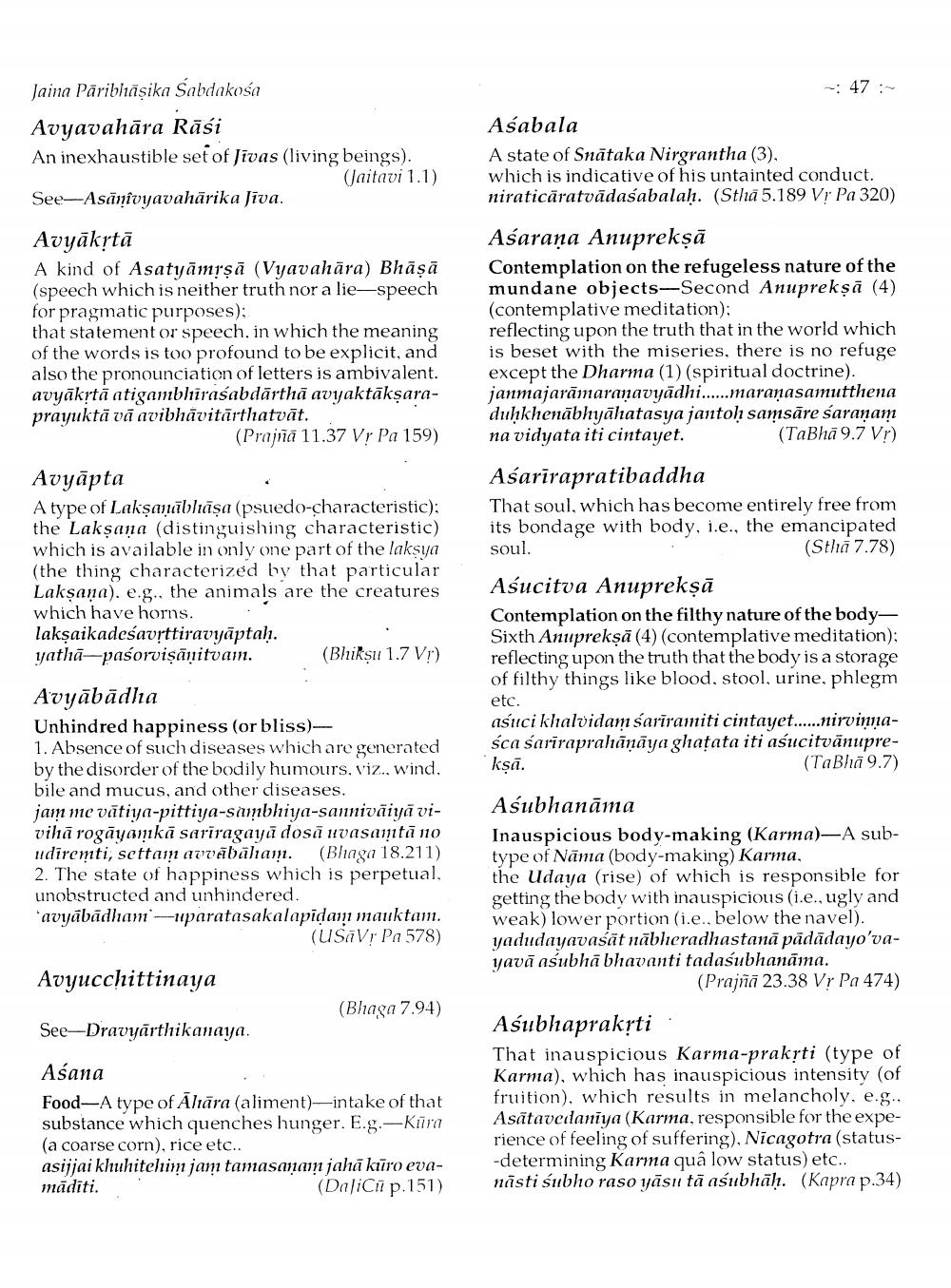________________
47 :
Jaina Pāribhāșika Sabdakosa Avyavahāra Rāśi An inexhaustible set of Jivas (living beings).
(Jaitavi 1.1) See-Asānivyavahārika Jiva.
Asabala A state of Snātaka Nirgrantha (3), which is indicative of his untainted conduct. niraticäratvädasabalah. (Stha 5.189 Vr Pa 320)
Avyākṣtā A kind of Asatyāmrşā (Vyavahāra) Bhāṣā (speech which is neither truth nor a lie-speech for pragmatic purposes); that statement or speech, in which the meaning of the words is too profound to be explicit, and also the pronounciation of letters is ambivalent. avyākytā atigambliiraśabdarthā avyaktākşaraprayuktā vā avibhāvitārthatvät.
(Prajmã 11.37 Vy Pa 159)
Asarana Anupreksā Contemplation on the refugeless nature of the mundane objects-Second Anuprekşā (4) (contemplative meditation); reflecting upon the truth that in the world which is beset with the miseries, there is no refuge except the Dharma (1) (spiritual doctrine). janmajarāmaranavyādhi......maranasamutthena duḥkhenābhyāhatasya jantoh samsāre saranam na vidyata iti cintayet.
(TaBhā 9.7 Vr)
Avyāpta A type of Laksanuīblāşa (psuedo-characteristic); the Laksana (distinguishing characteristic) which is available in only one part of the laksya (the thing characterized by that particular Laksana). e.g., the animals are the creatures which have horns. lakşaikadesavrttiravyäptah. yathā-pasorvişānitvam. (Bhiksu 1.7 Vr)
Asarīrapratibaddha That soul, which has become entirely free from its bondage with body, i.e., the emancipated soul.
(Stha 7.78) Asucitva Anupreksā Contemplation on the filthy nature of the body, Sixth Anuprekşā (4) (contemplative meditation); reflecting upon the truth that the body is a storage of filthy things like blood, stool, urine, phlegm etc. asuci khalvidam sariramiti cintayet.....nirvinnasca sariraprahānāya ghatata iti asucitvānupreksā.
(Tabhā 9.7)
Avyābādha Unhindred happiness (or bliss)1. Absence of such diseases which are generated by the disorder of the bodily humours, viz., wind, bile and mucus, and other diseases. jam me vātiya-pittiya-sambhiya-sanniväiyā vivihā rogāyamkā sariragayā dosā uvasaitā no udiremti, settain avvābālam. (Bhaga 18.211) 2. The state of happiness which is perpetual, unobstructed and unhindered. 'avyābādham-uparatasakalapidan mauktam.
(USãV? Pa 578)
Aśubhanāma Inauspicious body-making (Karma)—A subtype of Nāma (body-making) Karma, the Udaya (rise) of which is responsible for getting the body with inauspicious (i.e., ugly and weak) lower portion (i.e. below the navel). yadudayavasāt nābheradhastanā pādādayo'vayavā asubhābhavanti tadaśubhanāma.
(Prajna 23.38 Vr Pa 474)
Avyucchittinaya
(Bliaga 7.94)
See-Dravyārthikanaya.
Asana Food--A type of Altāra (aliment)-intake of that substance which quenches hunger. E.g.-kura (a coarse corn), rice etc.. asijjai khuhitelim jam tamasanain jahā küro evamāditi.
(DaliCu p.151)
Asubhaprakrti : That inauspicious Karma-prakrti (type of Karma), which has inauspicious intensity (of fruition), which results in melancholy, e.g., Asātavedaniya (Karma, responsible for the experience of feeling of suffering), Nicagotra (status-determining Karma quâ low status) etc.. năsti śubho raso yāsu tā aśubhāh. (Kapra p.34)




